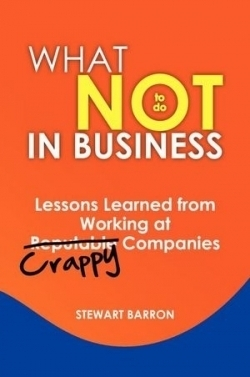What Not To Do in Business
Lessons Learned from Working at Crappy Companies
If Wall Street stopped smoking pixie dust in the rarified air up in the ivory towers and actually learned how to run a business, they would learn that 99% of a business cannot change on the dime…what [they] miss is that it is a lot faster to hire good management with a vision and tenacity to succeed than to keep rehiring CEOs and implementing their visions for nine months and repeating the process….In short, what most…are doing is ruining the very companies they are trying to invest in for the long-term.
If readers have followed the logic of this paragraph, then they have grasped the main theme of What Not To Do in Business: “Short-termitis” is bad (think Home Depot and WorldCom). Long-term vision is good (think Google and Apple).
But Stewart Barron doesn’t just pound this idea home like one note on a piano. His accompanying chords consist of anecdotes of management folly, zippy quotes, and a take-no-prisoners approach to telling it like it is. And, he is screamingly funny.
Readers will be stunned by stories like the one Barron shares about a crappy company’s name change: “[The company] felt that if they created slick ads showing local people working for a company with a new and fresh image that appeared to be that of a well-run company with modern systems and good customer service, you would not actually need to have those things.”
Cost of the campaign? Ten million dollars. Money that, Barron points out, could have actually helped fix the company’s internal issues.
Barron is a good writer (not a given in the world of business tomes) with a killer instinct for the zingers that help illustrate his point. He distills complicated market issues in the “Lessons to be Learned” section at the end of each chapter, employing charts and vivid analogies readers can easily picture. For example, he creatively asserts that focusing only on the next quarter’s profits is like “driving a supertanker and focusing on the next one hundred feet in front of you while ignoring the rocks a quarter mile ahead. A supertanker can take up to two miles to stop or change direction.”
Although the text seems to have been professionally edited, the covers lack polish. Barron may not have many business credentials behind his name, but as he states, “theories are best left on whiteboards.” His expertise comes most credibly from actually working at crappy companies.
If nothing else, this book would be worth a read to check out Barron’s theories on how readers can make money in the stock market by short-selling shares of crappy companies. How to know if they are bad? Check out their board of directors and CEO.
When your CEO cancels the Christmas party (violating Barron’s number one taboo), don’t get mad: get him or her this book.
Reviewed by
Holly Chase Williams
Disclosure: This article is not an endorsement, but a review. The publisher of this book provided free copies of the book and paid a small fee to have their book reviewed by a professional reviewer. Foreword Reviews and Clarion Reviews make no guarantee that the publisher will receive a positive review. Foreword Magazine, Inc. is disclosing this in accordance with the Federal Trade Commission’s 16 CFR, Part 255.

